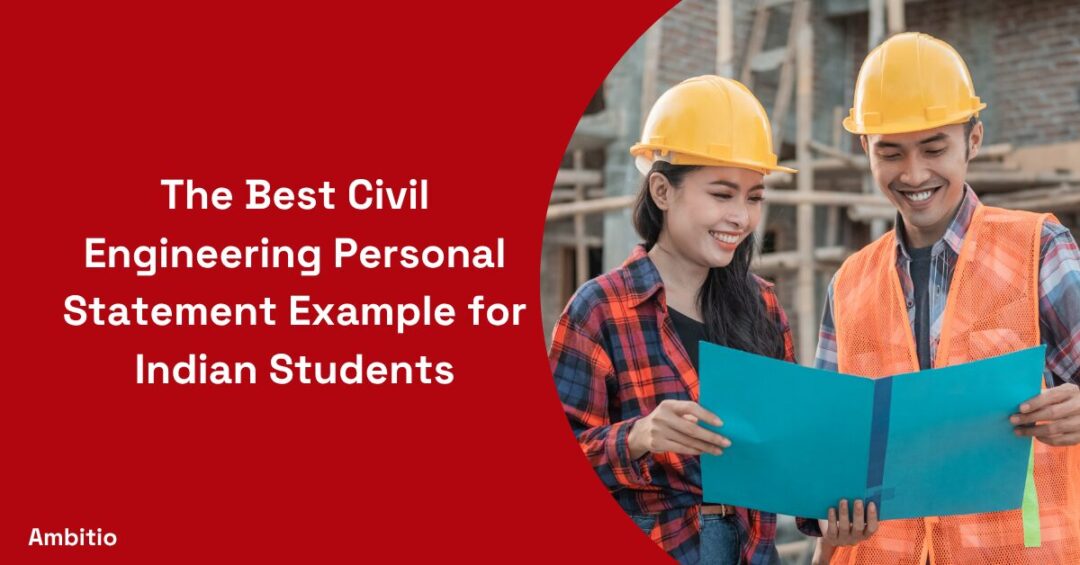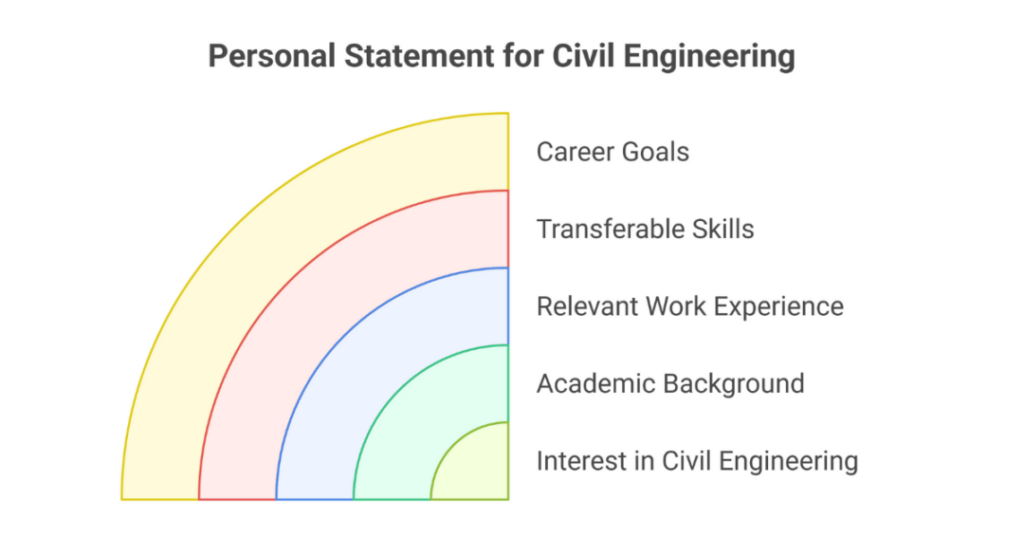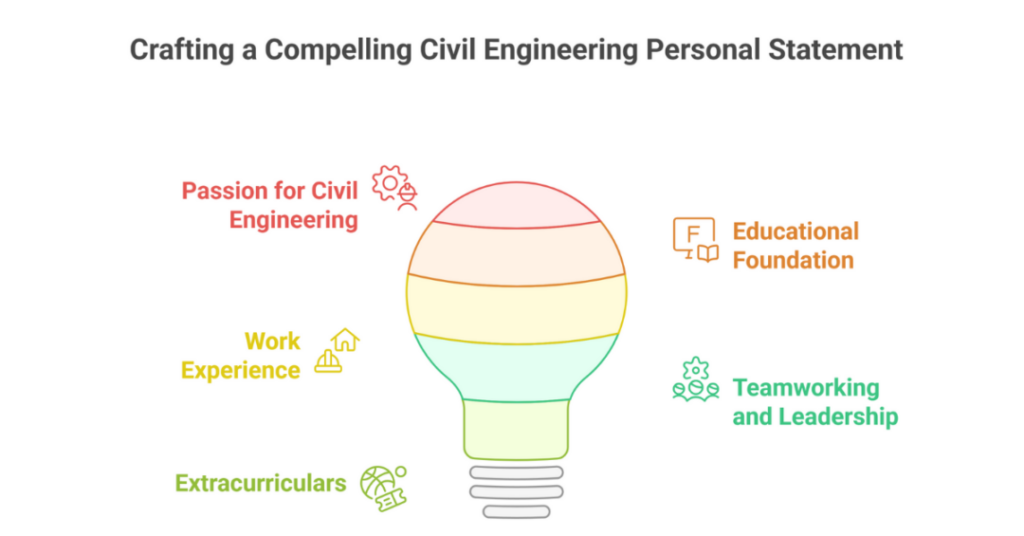17 June 2025
6 minutes read
The Best Civil Engineering Personal Statement Example for Indian Students

Key Takeaways
- Civil engineering personal statement example helps showcase your passion, technical skills, and suitability for studying engineering at university.
- Civil engineering personal statement example demonstrates how to effectively highlight relevant work experience and transferable skills.
- Civil engineering personal statement example reveals the structure and content needed to impress undergraduate uni’s and secure a successful application.
Civil engineering looms large as a career option, both literally and figuratively. From skyscrapers to bridges, the world is built by this field. For Indian students wishing to pursue civil engineering abroad, it is essential to write a winning personal statement.
It decides the quality of your application, particularly to undergraduate uni’s. This document should not just talk about your grades but reflect your fascination with engineering from a young age, your relevant employment experience, and passion for civil engineering.
Admissions officers in top universities often seek students with strong technical skills, time management, and critical thinking abilities. This is where a well-thought-out civil-engineering personal statement becomes a game-changer.
A combination of personal experience and technical interest, the optimal statement can turn a run-of-the-mill application into one that gets accepted. In the paragraphs below, we’ll dissect precisely what constitutes a powerful statement, what to put in, and give you an ideal example to base your own on.
What is a Personal Statement for Civil Engineering for Uni?
Did you know that over 85% of successful UCAS university applicants in the UK have dedicated more than 20 hours to getting their statement just right?

Here’s what your personal statement needs to describe:
- Interest in Civil Engineering: Why did you choose civil-engineering as my profession? Was it interest in infrastructure development in less developed countries or observing good infrastructure projects in your city?
- Academic Background: Highlight your mathematics and physics strengths. If physics was a subject in your course of study, indicate so.
- Relevant Employment Experience: Internships or a part-time job at a local construction company – whatever it is, highlight your experience with actual construction projects.
- Transferable Skills: Mention your critical thinking, problem-solving, communication skills, and time management skills as obtained through extracurricular activities or academics.
- Career Aspirations: State how you aspire to become a civil-engineer working on design and construction projects in the developing world or urban planning fields.
A successful statement doesn’t simply list achievements. It tells a story—your story—that communicates your suitability for engineering at university.
What to Include in Your Personal Statement for Civil Engineering?
Here’s a fun fact: Engineering graduates are among the top three most employable degree holders globally!
Before you begin writing your civil-engineering statement, outline the essentials. This will ensure your statement ticks all boxes and communicates your passion effectively.
Key Elements to Include:
- Passion for Civil Engineering: Demonstrate how your love for engineering from a young age blossomed into a defined goal.
- Educational Foundation: Mention how studying engineering, math and physics prepared you.
- Work Experience: List internships, placements, or a job at a local firm that provided hands-on experience.
- Teamworking and Leadership: Universities look for teamwork skills. Highlight roles where you worked in a group.
- Extracurriculars: Show interests outside academics that shaped transferable skills and reinforced your time management.
Essential Details Table:
| Element | What to Include |
|---|---|
| Academic Strengths | Math, physics, and problem-solving skills |
| Technical Skills | CAD, construction modelling, data analysis |
| Relevant Work Experience | Projects, internships, placements, job at a local construction company |
| Personal Qualities | Teamwork, organisation, communication skills, critical thinking |
| Career Goals | Contribute to projects in developing countries or improve urban infrastructure |
Adding all these points will boost the strength of your application, increasing your chances of a successful personal statement.
Civil Engineering Personal Statement Example for Undergraduate Universities
Fun fact: UCAS limits your statement to 4,000 characters, making every word count!
Here’s an opening line for inspiration:
“Ever since I watched a bridge being built in my hometown, I knew I wanted to contribute to the design and construction of such life-changing infrastructure.”
Below is a complete example:
Personal Statement – Civil Engineering (Sample)
Ever since I saw a cable-stayed bridge rise over the river near my house, my fascination with civil-engineering has only grown. I believe civil-engineering as my career will allow me to combine my strengths in mathematics and physics with my desire to solve real-world problems. Studying engineering at university will give me the technical skills to contribute meaningfully to infrastructure development.
I have consistently scored high marks in physics and mathematics, subjects that have honed my critical thinking and problem-solving skills. Participating in the National Science Exhibition further developed my analytical skills and taught me the importance of communication skills and organisation.
During my summer break, I undertook a placement at MetroBuild Pvt. Ltd., where I shadowed engineers working on high-rise residential projects. This relevant work experience gave me insight into team work skills and time management in large-scale construction projects. It confirmed my interest in civil engineering as my career path.
Beyond academics, I serve as the secretary of my school’s science club. Organising events taught me leadership and improved my teamworking abilities. My extracurriculars also include volunteering with a non-profit focused on infrastructure development in rural India, which deepened my interest in projects in developing regions.
I aspire to become a civil-engineer who makes a difference. Studying civil engineering at the University of Birmingham or the University of Toronto would equip me with a solid foundation to bring about change. I am confident that my passion, technical background, and relevant experience make me a suitable candidate for engineering at university.
Qualification Requirements for Civil Engineering and Other Related Personal Statements
Fun fact: Some universities weigh your statement as heavily as your ACT, SAT, IELTS or TOEFL scores!

Here’s what you’ll need to include:
- Academic Requirements: Strong background in maths and physics. Some institutions ask for SAT, ACT, or GRE scores.
- Language Proficiency: IELTS or TOEFL scores, especially for non-native English speakers.
- Recommendation Documents: Letter of recommendation, resume, and a statement of purpose.
- Entrance Exams: Depending on the country, SAT, GMAT, GRE might be needed.
- Transferable Skills: Evidence of team work, leadership, time management, and organisation.
Requirements Comparison Table:
| Requirement | Details |
| Core Subjects | Physics |
| Entrance Tests | SAT, ACT (USA); GRE or GMAT (grad-level) |
| English Proficiency | IELTS (min 6.5), TOEFL (min 90) |
| Supporting Documents | Letter of recommendation, resume, statement of purpose |
| Additional Skills | Communication, time management, problem-solving |
These qualifications and documents serve as the backbone of a successful application.
Conclusion
Your path to learning civil-engineering begins with the correct attitude and a compelling statement.
This article has taken you through it all—learning what a statement is to constructing an edifice full of enthusiasm for civil-engineering, pertinent work experience, transferable skills, and solid academic bases.
We demonstrated to you how to present your interest in engineering from childhood in a concise, meaningful career strategy that is in line with high-performing undergraduate uni’s requirements.
In the process, we touched on factors such as team work, physics, extracurricular activity, communication skills, and other relevant traits to make your statement effective.
From crafting good introductions to ending with a vision for your future, we made sure you’re ready for a successful application. Put in all the required qualifications—from IELTS and TOEFL to ACT and SAT scores—and never miss adding your resume and letter of recommendation.
Follow this as a blueprint, check everything twice, and have your statement show your commitment to engineering as much as your fit for engineering at university.
Let your voice ring, your passion ignite, and your aims guide the tone for a future in infrastructure development and projects in the developing world.
Now, go write that ace personal statement with Ambitio, your trusted abroad study partner!
FAQs
How does a civil engineering personal statement example help with university applications?
A civil engineering personal statement example helps students understand what to include and how to express their goals clearly. Reviewing a civil engineering personal statement example also ensures alignment with university expectations.
What should be included in a civil engineering personal statement example?
A civil engineering personal statement example should cover academic strengths, career goals, and relevant work experience. Including extracurriculars in a civil engineering personal statement example also adds value.
Where can students find a reliable civil engineering personal statement example?
Students can find a civil engineering personal statement example on university websites, official UCAS resources, or through study abroad consultancy blogs.
Can extracurriculars be part of a civil engineering personal statement example?
Yes, a civil engineering personal statement example often includes extracurriculars to show skills like teamwork, leadership, and time management.
What makes a civil engineering personal statement example successful?
A successful civil engineering personal statement example connects personal motivation with career goals while showcasing problem-solving and critical thinking skills.
Is it okay to use a civil engineering personal statement example as a template?
Using a civil engineering personal statement example as a template is fine, as long as it is personalized and reflects your genuine experiences and aspirations.
How long should a civil engineering personal statement example typically be?
A civil engineering personal statement example should typically be around 500–600 words, following UCAS or university-specific length requirements.

You can study at top universities worldwide!
Get expert tips and tricks to get into top universities with a free expert session.
Book Your Free 30-Minute Session Now! Book a call now




























